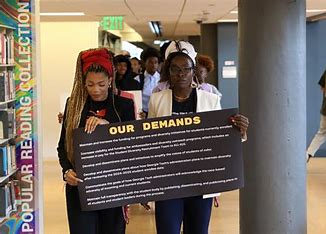Creating a civic impact that extends beyond the Institute, the Tech chapter of the National Association for the Advancement of Colored People (GT NAACP) became one of Tech’s newest Registered Student Organizations (RSOs) late last year. Within a short time on campus, the chapter already has added meaningful accomplishments to its name.
The Technique spoke to Camille Trotman, fourth-year LMC and chapter president, Chase Pettiford, third-year BIO and external vice-president, Alyssa Wright, fourth-year BMED and internal vice-president and Iman Al Harthy, fourth-year ENVE and political action chair, to understand their own motivations behind activism and their journey with the Tech charter of the national organization.
“When I was hosting a youth rally in Smyrna in summer 2020, I reached out to the Cobb County NAACP among other organizations that were registering voters. They alerted me to the fact that Tech did not have an NAACP chapter. I was already familiar with the NAACP through my mother, who is a lifetime member,” Trotman said.
While Al Harthy and Wright had exposure to activism while growing up, Pettiford grew up in a predominantly white neighborhood with limited access to such avenues. Wright met Trotman at Tech in 2020 and was one of the founding members of GT NAACP. In May 2022, the chapter was officially chartered by the national-level organization. After their constitution was approved by the Institute, GT NAACP became an RSO in November 2023.
“There was some pushback from other Black Student Organizations who felt that we were competing for black student representation. However, we now have consensus on the difference in their goals and ours. We see the other organizations as more socially focused whereas NAACP has a focus on activism,” Trotman said on community relations.
Pettiford spoke about the goals that GT NAACP had that were specific to the Institute.
“We need to educate people about the Black community. NAACP can discuss disparities in Atlanta and important legislation that could affect our community during our meetings. The march we organized last spring to celebrate 50 years of Black women at Tech highlighted that Black women hadn’t been around for that long here. We want to bring the community together through events like the U.R.G.E [Underrepresented Groups in Education] forum,” Pettiford said.
GT NAACP played a significant role during the elections in Fall 2022. According to Trotman, over 10,000 text messages and 2,000 phone calls were made to register voters through events like the “Power Hour,” an hour-long meeting where the chapter encouraged members to call and message voters. The Tech chapter was highlighted among NAACP college and youth chapters for the amount of phone and text banking done through their link.
Al Harthy spoke about her goals for the chapter. “Continuing the U.R.G.E forums and conversations is one of our goals. We want to push for tangible policies that can help minority students at Tech. We are collaborating to talk about Women’s History Month — particularly on reproductive rights. We want to get more of the student body involved,” Al Harthy said.
While the students were confident the chapter had made a difference on campus, they expressed hope that more students across backgrounds would join them.
“We want more members, not just Black students, to join us. At the Org Fairs, Black students would sometimes visit us, but other students would think that NAACP was not for them. We would love to have a more diverse membership. What I’d also love is if members of GT NAACP could take on more responsibility, such as becoming regional coordinators of Atlanta campuses or something at the national level,” Wright said.
Pettiford echoed the sentiment, explaining that people could find their own space for activism within GT NAACP. “As a biology major, I’m really not interested in reading through bills — but solving the disparities in Atlanta is what I’m keen to do. Some international students come to us and say that they can’t vote, but the NAACP still has something for them,” Pettiford said.
Al Harthy took this cue to explain her distinct background and work. “I’m an international student from Oman and Pakistan, so I can’t vote, but I’m still doing a lot of activism. We conducted a global crisis meeting, where we discussed how students could help in that situation even if they weren’t from there. We want to talk about safety and equality all around the world, with diversity in what we cover,” Al Harthy said.
GT NAACP also has plans in place for reaching out to students outside of the Black community. “If we keep doing work and having more conversations, hopefully, we can get more members or reach out to more of the student body by word of mouth. At one of our general body meetings, we spoke about Roe v. Wade, even though it was not strictly NAACP-related. Some people didn’t expect us to discuss it, but we want to show that we care about these issues as well,” Al Harthy said.
The chapter primarily uses their general body meetings as working sessions and strives to meet measurable goals. The meetings are held 6:30 p.m. on Thursdays in Room 107 of the East Architecture building.
“In the future, I always want there to be an action item for each meeting. By the end of each voter registration meeting, we target having sent out 1,000 messages. We also look to send out letters of grievances to elected officials. At one of our meetings, we had a session about gifted and special education rights, which was one of the highlights for me,” Trotman said.
GT NAACP is just one of many RSOs that cater to the needs of Black students and student activism on campus. For more information visit their Linktree at linktr.ee/gt_naacp.
